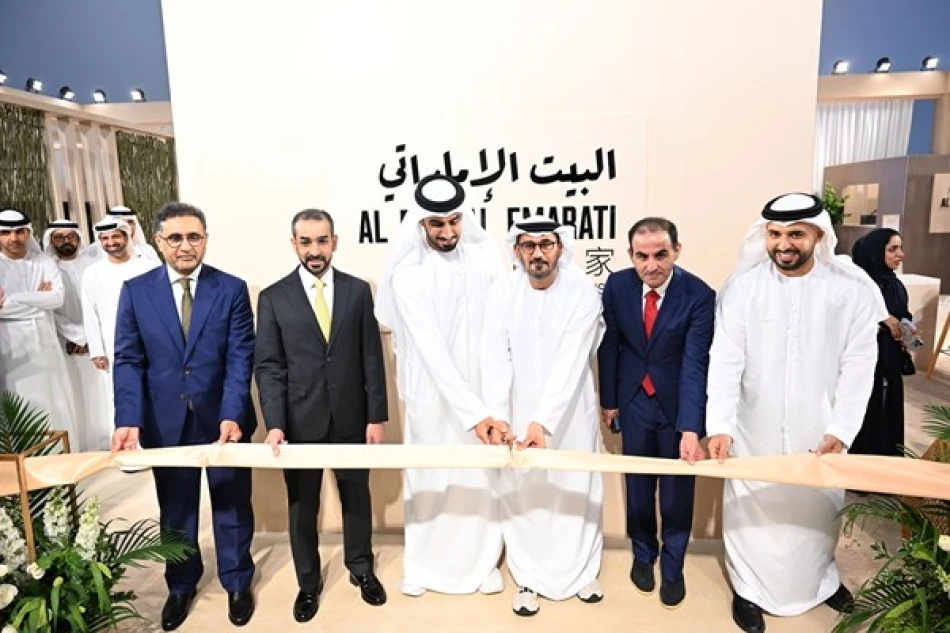
Emirati Home: A Cultural Window Showcasing UAE's Rich Heritage in China
UAE Leverages Cultural Diplomacy to Deepen Strategic Partnership with China
The UAE Embassy in Beijing is orchestrating an ambitious cultural diplomacy campaign that goes far beyond traditional diplomatic engagement, positioning cultural exchange as a cornerstone of the UAE-China strategic partnership. Through initiatives like the "Emirati House" cultural events and participation in major Chinese cultural venues, the UAE is demonstrating how smaller nations can punch above their weight in great power competition through soft power projection.
The "Emirati House" Strategy: Cultural Branding on a Global Stage
The UAE Embassy's flagship "Emirati House" initiative represents a sophisticated approach to cultural diplomacy, scheduled to appear at the Huairo Great Wall of China Marathon and Zayed Charity Race 2025 from September 19-22, 2025. This marks the first time the event will be held in Beijing, signaling the UAE's growing cultural footprint in China's capital.
The initiative offers visitors an immersive experience in Emirati traditions, folk arts, handicrafts, traditional cuisine, and hospitality. This approach mirrors successful cultural diplomacy strategies employed by South Korea's Korean Wave and Japan's Cool Japan initiatives, demonstrating how cultural exports can enhance diplomatic and economic relationships.
Beijing International Book Fair: Testing Ground for Cultural Exchange
The embassy's participation in the 31st Beijing International Book Fair (June 18-22) served as a proving ground for the "Emirati House" concept. The pavilion, opened by UAE Ambassador Hussein bin Ibrahim Al Hammadi alongside UAE Ministry of Culture officials, featured traditional Arab hospitality, Arabic calligraphy, and a comprehensive library of Emirati publications.
The pavilion hosted 16 cultural dialogue sessions involving exhibitors, writers, and intellectuals, generating significant engagement from Chinese and international visitors. This level of programming suggests the UAE is treating cultural diplomacy as seriously as economic partnerships, investing substantial resources in sustained cultural engagement rather than one-off events.
Timing Strategic Cultural Investment with Diplomatic Milestones
The UAE's cultural push coincides with the 40th anniversary of diplomatic relations between the two countries, established in 1984. The relationship was elevated to a comprehensive strategic partnership in 2018, making the UAE one of China's key Middle Eastern partners alongside Saudi Arabia and Iran.
The "UAE-China Friendship Festival," organized in collaboration with the Central Academy of Fine Arts, featured joint artistic works and exhibitions that blend Emirati and Chinese creative traditions. Live demonstrations by the Al Ghadeer Foundation for Emirati Crafts, showcasing traditional weaving and palm frond crafts, attracted notable attention from Chinese audiences.
Educational Partnerships as Long-term Investment
The cultural initiatives complement deeper educational cooperation, including the "Hundred Schools Project" aimed at teaching Chinese language in UAE schools. This mirrors Singapore's bilingual education model and reflects the UAE's pragmatic approach to preparing its population for a multipolar world where Chinese language skills provide competitive advantages.
Market and Strategic Implications
For investors and policymakers, the UAE's cultural diplomacy strategy offers several insights. First, it demonstrates how middle powers can maintain relevance in US-China competition by positioning themselves as cultural and economic bridges. The UAE's approach contrasts with more confrontational stances taken by some Western allies, potentially offering Chinese businesses and investors a more neutral gateway to global markets.
Second, the sustained investment in cultural programming suggests the UAE views its China relationship as generational rather than transactional. This long-term perspective aligns with Chinese diplomatic preferences and could yield dividends as China's Belt and Road Initiative continues expanding westward through the Middle East.
Broader Regional Context
The UAE's cultural diplomacy in China occurs against the backdrop of shifting Middle Eastern alignments. While traditional US allies like Saudi Arabia maintain complex relationships with Washington, the UAE's approach suggests confidence in pursuing independent foreign policy tracks that complement rather than compete with its Western partnerships.
This strategy positions the UAE as a potential model for other Gulf states seeking to diversify their international relationships without triggering US concerns about strategic alignment. The emphasis on cultural rather than military cooperation provides political cover while building substantial people-to-people connections that could prove valuable in future economic negotiations.
The embassy's initiatives, from cultural pavilions to marathon sponsorships, represent a calculated investment in soft power that could enhance the UAE's position as both a regional hub and a bridge between East and West in an increasingly multipolar world.
Most Viewed News

 Layla Al Mansoori
Layla Al Mansoori






